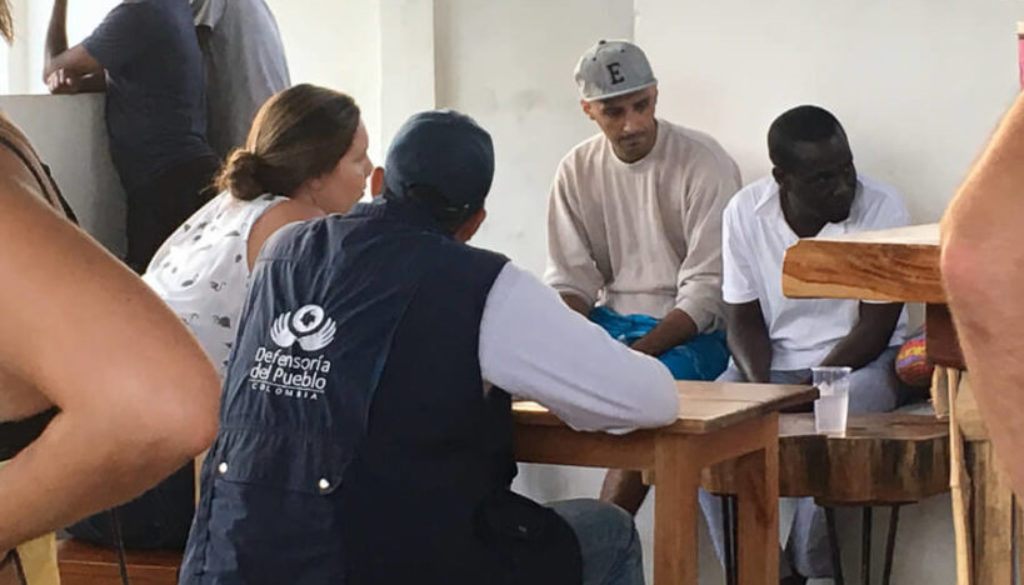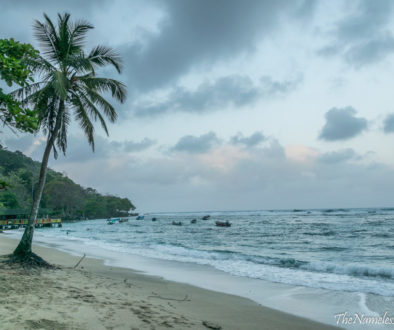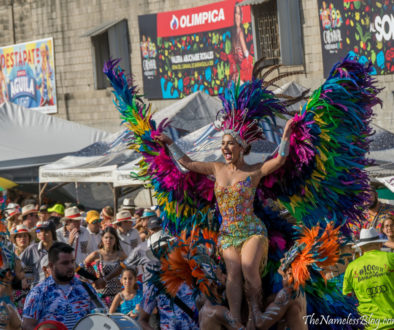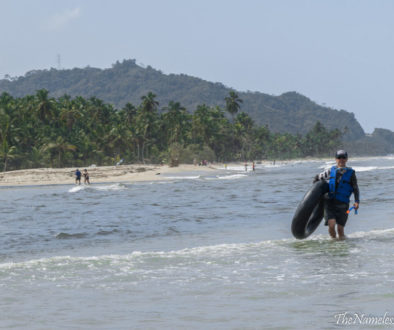Darien Gap Crisis
Stranded Migrants in the Darien Gap Crisis Colombia
The Darien Gap is the stretch of no man’s land between Panama and Colombia. A 66 mile long stretch of mountains, jungle, marsh and swampland. This area is said to be too difficult and costly to produce roads or infrastructure in the region.
Where it All Began
This leg of my 13 month South American adventure started in late January of this year (2018). I had heard about this magical island paradise just off the beaten path a few countries ago. An amazing tale of beautiful sand beaches and gorgeous trails through the jungle. Everytime I closed my eyes I would imagine the ocean breeze hitting my face and the sand tricking down between my toes.
Turns out some stories are true. The small paradise of Capurgana was everything I had wished for and more. If there was any single place I could return to in South America, this would be it.
Something Seems Strange
It only took a few days of wandering around Capurgana to notice something was strange about the people in the town.
Some of them stuck out like sore thumbs.
And I’m not talking about the occasional visiting westerner.
No, these people were different.
They look different, they dress different, and they just wander around the town what appears to be aimlessly.
I think to myself, these guys can’t be Colombians, they probably aren’t even from South America.
But wait. They surely aren’t the typical travelers you’d expect to come across.
Most of them appeared to be of African decent, but not one of the many Afro-Colombian or Afro-South Americans that I’ve met along the way.
They didn’t wear beach or fishermen clothing like all the locals did. They aren’t hard at work like all the others.
No, these people are surely different.
Meeting The Different People
One evening after having a few beers on the beach with my diving friend. We ran into one of the out of place guys.
I began to speak to him in Spanish, his eyes lit up and he attempted to speak back to me. Only problem was I couldn’t understand much of what he was saying.
Just as I look to my friend he jumps in and starts to conversate. Turns out, the stranger is speaking French.
My thoughts, how the heck are you smack-dab in the middle of nowhere and you don’t speak any Spanish. This far outside of the normal tourist route how could someone get by without some basic Spanish skills?
The conversation went on for a bit and my curiosity grew.
…Turns out I might have had one too many Coco-locos as they call the alcohol infused coconuts on the beach.
It’s time to turn in, my curiosity would have to wait for another day.
Happy Hour
One of the popular bars along the coast has a really nice happy hour that everyone, local and visitor often join in on.
I arrive and order a beer. After a bit the different people start to file in. No big deal right? Except they all sit in the corner as if they are waiting for something.
The group grows and grows, after about an hour there are probably 15-20 men, women and children.
Then walks in two men with jackets saying “Defensoria del Pueblo” along with the owner of the bar Joni.
Defensoria del Pueblo, Colombia
The music is turned off at the bar. The owner lets everyone know that this is an organization to protect the human rights of people. She starts to talk about the Darien Gap crisis.
This is a public meeting and we are given the chance to stay.
What turns out to be migrant are broken down into groups by language English, French and one of the African dialects.
The American Dream
All of the people here have started their journeys from Africa in hope to reach The United States. Many from Ethiopia Eritrea and Ghana.
Story after story of famine, genocide, war, countries of no opportunity and misery are openly shared.
The members of the human rights organizations take written accounts as fast as they can. Appearing to struggle keeping up with the heartbreaking stories.
At one point Joni stands up and says “just because you don’t have paperwork doesn’t mean you aren’t human”.
They continue to explain that under the law of The UN all people no matter their status have basic human rights.
The organization also explains that many of the people here are fleeing violence which makes them refugees and able to request political asylum.
After a few hours the meeting closes with a final statement, we are working towards gaining humanitarian aid from THE UN. This likely won’t help the people here today but will hopefully help the next people in your same situation.
A sad yet realistic reality if you ask me.
Darien Gap Crisis, A Somber Story
The next following days as usual I wander to the beach. After a few hours I head into town for lunch and end up sitting just across from Dari.
He has an unusually familiar accent. I ask him where he is from and he says Ghana but has been living in Washington DC since he was 15 years old, only two hours from my city!
Dari’s Story
Dari traveled back to Ghana to visit his dying parents. According to him after the death of his parents he tried to return to USA. On his return his green card was rejected on a technicality.
Dari continued to say that in his country it could take months or years to sort this out. All the while he has a wife and child living in Maryland.
He decided to illegally cross into the country. By flying into Ecuador and traveling overland headed north.
He spent seven days traveling through the jungle of The Darien with illegal guides and a small group of other migrants.
Dari’s accounting of the journey was horrific. He spoke about days and days of harsh traveling conditions with little food or water.
The death of one woman after a snake bite her in the night.
Two other children getting washed away never to be found when forced to cross a river on foot.
But worse than the journey says Dari is the life you can expect if caught in Costa Rica or Panama.
Dari nearly in tears speaks about how he was jailed in Costa Rica for 7 months when authorities caught him trying to leave their country without documentation.
He tells the story of meager living conditions and having another person stabbed right next to him in the prison. His eyes in a state of disbelief.
Now he just hopes to make it back to his family as soon as possible.
Unfortunately, Dari’s story is far from unique in the Darien Gap Crisis.
Jonas’ Story
Jonas spent many years living in New York City as a taxi driver. He doesn’t seem to want to get into the story of how he found his way back to Eritrea.
Our conversation is short, he’s barely able to get the words out of his mouth.
He tells me he “feels like a dog, brought out and left in the street”.
Jonas talks about the treatment he received after being detained in Costa Rica.
According to his account he was held there for months in terrible conditions. At one point being held in a once abandoned facility somewhere in the jungle.
According to Jonas The UN monetary aid is meant to house migrants in migrant facilities but most of his time was spent in prisons alongside murders.
The 3 Ethiopians
On another day I run into three young guys from Ethiopia sitting around the futbol field.
They ask me where I am from, I tell them.
I expect to instantly feel hatred.
Instead, they are all smiles and curiosity.
Where from?! Philadelphia I answer.
The second man answers Go Eagles, right?!
Yes, go Eagles I reply.
One man then asks me what is wrong with your president?
Honestly, I don’t know how to answer. I kindly just make an awkward face.
The guy continues on to say how he thought President Bush was inhuman but Trump is satan.
The Costa Rican government, The Panamanian government all work for satan.
Again, I really don’t know what to say.
The conversation turns again when I ask them how do they like Capurgana.
They all answer together they can’t wait to get out of here.
We want to go to USA. Life is hard in Colombia.
We want to go where there is more opportunities.
I think to myself how could anyone hate this small slice of paradise?
Then I remember that I’m here of my own free will, I am comfortable, I don’t have to worry where my next meal will come from and I don’t have to sit in limbo wondering where I will go next.
Yes, it’s another gentle reminder of how fortunate many of us are but don’t even realize.
Local People of Capurgana
The local people of the town are among the most friendly I’ve met in the country.
But even they appear to have been growing short of patience with the stranded people.
One day as I walk across the field into town one of the displaced people asks me to buy him some bread from the bakery nearby, he says he hasn’t eaten in two days.
I buy him a few things and pass them to him. He offers me a piece. I kindly motion no.
He wishes me a good day and walks away.
Behind him I notice a woman in the restaurant shaking her head.
I decided to have lunch at her shop and ask her what was on her mind.
She says that she has been struggling to build her business here for years. With the new ferries available from Necocoli many more visitors are coming to the town.
Finally business is doing well and she can provide for her family. Things are turning around for the local people here.
She fears that the increasing population of migrants will scare the visitors away.
She says that people come here because they don’t have to worry about the crowded beaches and scouts surrounding you to sell you things like they do in the northern beach towns.
She’s quite correct. If you’ve ever been to Cartagena or any of the popular coastal towns you can’t walk ten feet without someone trying to sell you something.
The shopkeeper fears that if a solution isn’t found soon the people will be forced to ask visitors for money and possibly crimes like theft will go up.
Visitors in turn will stop coming to the region. Leaving the local people at a disadvantage.
I ask her if she agrees that this is a Darien Gap crisis?
She simply offers her condolences and says her family struggles themselves and ends the conversation there.
Darien Gap Crisis, A Glimmer of Hope
In every grim story there is always a knight in shining armor. In this case that knight is the American owner of the bar where the meeting took place. She goes by the name Joni.
She accounts the situation as a current day humanitarian crisis.
Over the years the number of migrants crossing through the jungle has risen. The border security of Panama and Costa Rica has also strengthened.
I ask why and the common theories have been on pressure from President Trump’s regime and the money produced by The UN.
See, according the people here The UN will pay up to $107 per day for each refugee you have in your care.
The pay is for things like food, water, shelter and medical attention.
The theory is that this is why it is taking so long to process the deportations in the area.
Another point to note is the people are sent to the neighboring countries not back to their homelands.
Costa Rica will take them by boat to the border of Panama. Panama will take them directly to the border of Colombia.
Colombia has strong human rights organizations respective to the region will allow the people to stay in Capurgana and attempt to figure out their own situation.
After a few weeks they will then take them by boat back to Panama. A seemingly unending cycle.
During their time in Capurgana Joni has set temporary housing for the migrants, she’s working closely with Colombia’s human rights organization to provide a more permanent solution.
Afterwards
Now nearly 9 months later back in the comfort of my bedroom I am reminded of the people I met in Capurgana. The visitors, the locals and the people stranded are fresh on my mind as if I met them yesterday.
A hot topic on The US news is what is happening on the US/Mexico border. Families are being detained and kept separately after trying to cross illegally.
It reminds me of the people and families I met in Capurgana.
Despite the politics and the red tape, we are all human.
I hope that they have reached a better situation. Hopefully the world becomes a little more tolerant of one another.
I don’t know what to expect with this piece. When I started this blog I just wanted to share stories with my friends and family.
Turns out some stories will change you forever…The Darien Gap crisis is real, it’s happening right now and the world doesn’t know it.









